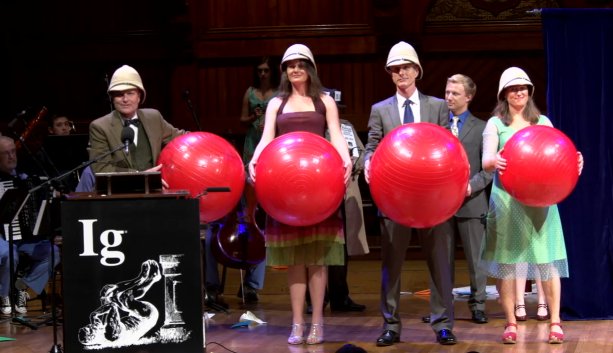

Last night were the Ig Nobel Prizes, the most important of Nobel Prize ceremonies. The ceremony honors the year’s strangest–but also very good!–scientific research, in 10 different categories. Past winners have included research on remote-controlled whale snot retrieval and the physics of why you don’t spill your coffee. So how did this year stack up?
Oh, man. Some real gems. Here they are:
MEDICINE PRIZE
For: “assessing the effect of listening to opera, on heart transplant patients who are mice.”
Reference: “Auditory stimulation of opera music induced prolongation of murine cardiac allograft survival and maintained generation of regulatory CD4+CD25+ cells,” Masateru Uchiyama, Xiangyuan Jin, Qi Zhang, Toshihito Hirai, Atsushi Amano, Hisashi Bashuda and Masanori Niimi, Journal of Cardiothoracic Surgery, vol. 7, no. 26, epub. March 23, 2012.
[Ed note: It had an effect, actually.]
PSYCHOLOGY PRIZE
For: “confirming, by experiment, that people who think they are drunk also think they are attractive.”
Reference: “‘Beauty Is in the Eye of the Beer Holder’: People Who Think They Are Drunk Also Think They Are Attractive,” Laurent Bègue, Brad J. Bushman, Oulmann Zerhouni, Baptiste Subra, Medhi Ourabah, British Journal of Psychology, epub May 15, 2012.
[Ed note: Ha, Beer Holder.]
JOINT PRIZE IN BIOLOGY AND ASTRONOMY
For: “discovering that when dung beetles get lost, they can navigate their way home by looking at the Milky Way.”
Reference: “Dung Beetles Use the Milky Way for Orientation,” Marie Dacke, Emily Baird, Marcus Byrne, Clarke H. Scholtz, Eric J. Warrant, Current Biology, epub January 24, 2013. The authors, at Lund University, Sweden, the University of Witwatersrand, South Africa, and the University of Pretoria
[Ed note: We wrote about this study! It rules.]
SAFETY ENGINEERING PRIZE
For: “inventing an electro-mechanical system to trap airplane hijackers — the system drops a hijacker through trap doors, seals him into a package, then drops the encapsulated hijacker through the airplane’s specially-installed bomb bay doors, whence he parachutes to earth, where police, having been alerted by radio, await his arrival.”
Reference: US Patent #3811643, Gustano A. Pizzo, “anti hijacking system for aircraft”, May 21, 1972.
[Ed note: ???]
PHYSICS PRIZE
For: “for discovering that some people would be physically capable of running across the surface of a pond — if those people and that pond were on the moon.”
Reference: “Humans Running in Place on Water at Simulated Reduced Gravity,” Alberto E. Minetti, Yuri P. Ivanenko, Germana Cappellini, Nadia Dominici, Francesco Lacquaniti, PLoS ONE, vol. 7, no. 7, 2012, e37300.
[Ed note: But that would be awesome, right?]
CHEMISTRY PRIZE
For: “discovering that the biochemical process by which onions make people cry is even more complicated than scientists previously realized.”
Reference: “Plant Biochemistry: An Onion Enzyme that Makes the Eyes Water,” S. Imai, N. Tsuge, M. Tomotake, Y. Nagatome, H. Sawada, T. Nagata and H. Kumagai, Nature, vol. 419, no. 6908, October 2002, p. 685.
[Ed note: Also in that study: Can we create a super onion that doesn’t make our eyes water?]
ARCHAEOLOGY PRIZE
For: “parboiling a dead shrew, and then swallowing the shrew without chewing, and then carefully examining everything excreted during subsequent days — all so they could see which bones would dissolve inside the human digestive system, and which bones would not.”
Reference: “Human Digestive Effects on a Micromammalian Skeleton,” Peter W. Stahl and Brian D. Crandall, Journal of Archaeological Science, vol. 22, November 1995, pp. 789–97.
[Ed note: Om nom.]
PEACE PRIZE
(To the president of Belarus) For: “making it illegal to applaud in public, AND to the Belarus State Police, for arresting a one-armed man for applauding.”
[Ed note: Also existing is banned. Stop. You’re doing it right now. Stop.]
PROBABILITY PRIZE
For: “making two related discoveries: First, that the longer a cow has been lying down, the more likely that cow will soon stand up; and Second, that once a cow stands up, you cannot easily predict how soon that cow will lie down again.”
Reference: “Are Cows More Likely to Lie Down the Longer They Stand?” Bert J. Tolkamp, Marie J. Haskell, Fritha M. Langford, David J. Roberts, Colin A. Morgan, Applied Animal Behaviour Science, vol. 124, nos. 1-2, 2010, pp. 1–10.
[Ed note: If cow tipping were real this could be significantly more complicated.]
PUBLIC HEALTH PRIZE
For: “the medical techniques described in their report “Surgical Management of an Epidemic of Penile Amputations in Siam” — techniques which they recommend, except in cases where the amputated penis had been partially eaten by a duck.”
Reference: “Surgical Management of an Epidemic of Penile Amputations in Siam,” by Kasian Bhanganada, Tu Chayavatana, Chumporn Pongnumkul, Anunt Tonmukayakul, Piyasakol Sakolsatayadorn, Krit Komaratal, and Henry Wilde, American Journal of Surgery, 1983, no. 146, pp. 376-382.
[Ed note: Okay then! Until next year, friends.]
You can watch last night’s ceremony here. There were people dressed as mice and also an opera.
